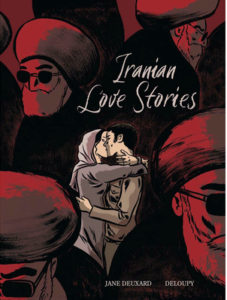It’s always so frustrating reading books like this and feeling the shock of recognition turn into a weariness, then a resentment at the fact that people don’t think this shit could happen to them, too.
 The Iranians certainly didn’t think they’d lose their freedom in the late 70s when a coalition of communists and Islamic fundamentalists banded together to throw out the American-backed, corrupt Shah. The fundamentalists quickly turned on and routed the communists, setting up a hardline right-wing regime that was swiftly, if unwittingly, propped up by Iraqi aggression. Decades later and the Iranian fight for civil liberties seems to be on its last legs, the Green Revolution a dying gasp in the face of a brutal authoritarian state that hides behind theology to justify its excesses. The Iranian people are tired, and cowed, and doing whatever they can to survive.
The Iranians certainly didn’t think they’d lose their freedom in the late 70s when a coalition of communists and Islamic fundamentalists banded together to throw out the American-backed, corrupt Shah. The fundamentalists quickly turned on and routed the communists, setting up a hardline right-wing regime that was swiftly, if unwittingly, propped up by Iraqi aggression. Decades later and the Iranian fight for civil liberties seems to be on its last legs, the Green Revolution a dying gasp in the face of a brutal authoritarian state that hides behind theology to justify its excesses. The Iranian people are tired, and cowed, and doing whatever they can to survive.
This is the atmosphere that Jane Deuxard, the pseudonym for two journalists who travel through Iran undercover, reports on in the pages of this distressing graphic novel. Everyone they interview is in an extended state of coping: their material needs may be more or less cared for, but their psychological, existential crises almost bleed off the page. From the sincere young revolutionary broken by the death of Neda, the figurehead of the Green Revolution’s rebellion, to the gleefully anti-feminist young woman who insists that women are treated much better in Iran than in the West, the stories of these mostly young people makes for traumatizing reading.
Perhaps I feel it more keenly because I lived my adolescence in a country with religious police too, and live now in a country that flirts with authoritarianism on the daily. I understand how tempting it is to have a strong man (or men, and why is it almost always men?) relieve you of the burden of thinking for yourself, especially when confronted with all these people demanding you take accountability for the things you never thought were harmful. But it is never worth it. My fellow Americans, we can’t give up our rights just because it’s easier to let someone else make the hard choices. Otherwise, well, Iran is a cautionary tale for a reason.
And the fact that I’m spending almost as much of this review ranting about politics than I am actually talking about the book is testament to the raw truth Deuxard presents, in understated prose that lets their interview subjects speak for themselves. They do their best to interview as wide a range of young Iranians as possible, tho the lack of anything non-heteronormative is glaring. Perhaps those interview subjects were impossible to find: I wish the authors would have stated so plainly, were that the case.
Zac Deloupy does amazing work, evoking Marjane Satrapi’s acclaimed oeuvre while doing even more with art as metaphor. From the many-headed mother to the depictions of the monstrous police, his illustrations add layers of subtext to the heartbreakingly straightforward confessions of the interviewees.
At the end of this book, I felt sad and mad. The voices were new and the details were different, but it was still so frustrating to hear the same story from Iran that we’ve heard for decades now, and not know how to help. This, I suppose, is the point of bearing witness, of watching a people’s souls wither without choice, to give them our hearts and in return carry their story to others, to save others from a similar fate. It’s just so hard to not be disheartened sometimes, and to have to futilely wish for better for everyone. In a perfect world, Deuxard & Deloupy wouldn’t have to risk so much to tell these stories, and their subjects wouldn’t have these terrible tales to tell.
Iranian Love Stories by Jane Deuxard & Deloupy was published yesterday December 14 2021 by Graphic Mundi and is available from all good booksellers, including
